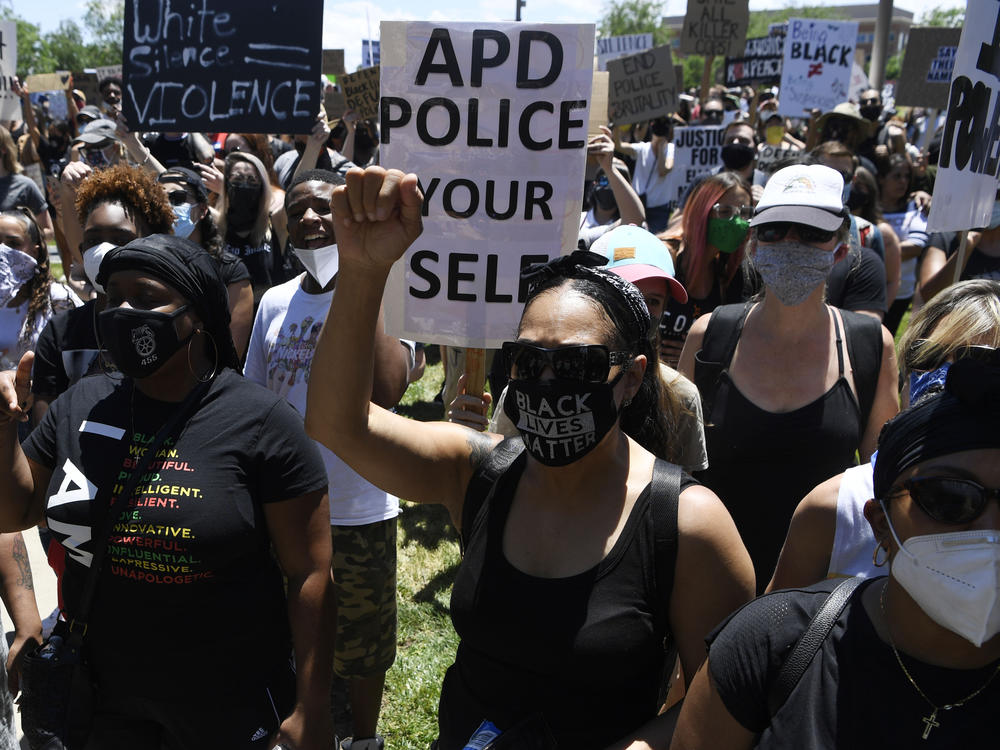Section Branding
Header Content
No Charges For Colorado Officers Who Held Black Children At Gunpoint
Primary Content
The Aurora, Colo., Police Department officers who held a woman and four Black girls ranging in age from 6 to 17 years old at gunpoint after wrongly suspecting they were in a stolen car, will not face any charges.
The decision puts an end to months of review by the District Attorney's Office of the 18th Judicial District, which called the incident "disturbing" but ultimately ruled the officers hadn't acted unlawfully during the traffic stop.
"What happened to the innocent occupants is unacceptable and preventable, but that alone is an insufficient basis to affix criminal culpability to the two officers involved in the initial contact," Clinton McKinzie, chief deputy district attorney in the 18th Judicial District, wrote in a letter explaining the decision, the Denver Post reported.
On Aug. 2, Officers Darian Dasko and Madisen Moen misidentified Brittney Gilliam's SUV license plate as one that matched that of a stolen out-of-state motorcycle.
The Denver Post explains: "A license plate reader installed at an Aurora intersection had alerted police to the car, a blue SUV, because it had the same license plate numbers as a stolen motorcycle from Montana. Officers failed to check whether the SUV matched the physical description of the stolen vehicle."
The error turned what had been a fun girls' trip to the nail salon into a traumatic and terrifying experience.
Pulling into a parking lot, the officer's pulled out their guns and ordered Gilliam and her 6-year-old daughter, as well as the woman's 12-year-old sister and 14- and 17-year-old nieces out of the car.
The incident was captured on video and shared on social media and it was one of several racially charged police encounters that sparked protests across the country over the summer.
In the video, the six-year-old is seen sitting on the ground of a parking lot, crying and wailing as Gilliam and the other girls are forced to lie face down on the pavement with their hands behind their backs.
"Why are you doing this?" at least one of the girls screams several times between sobs.
After two additional officers arrive on the scene, they eventually realize their mistake and proceed to uncuff the children and Gilliam, and apologize.
A day after the traumatizing incident, Interim Chief of Police Vanessa Wilson said the officers had followed the department's "high-risk stop" protocol, which "involves drawing their weapons and ordering all occupants to exit the car and lie prone on the ground."
"But," she added, "we must allow our officers to have discretion and to deviate from this process when different scenarios present themselves."
On Friday, McKinzie said, "It is our hope, however, that APD will immediately undertake a review of their policies to try and ensure that nothing of this sort ever happens again," McKinzie said, according to the AP.
The Aurora Police Department declined to offer a statement to NPR regarding Friday's decision, saying they cannot comment on an ongoing investigation.
"We still have an Internal Affairs investigation going on," a spokeswoman told NPR.
"When white cops point guns at small Black children, there are no consequences in America," David Lane, a lawyer for Gilliam and the girls told the AP.
He added that the decision fits a pattern in Aurora, which has been accused of having a history of racism and brutality.
In February, the Aurora Police Department cleared the three officers involved in the death of Elijah McClain, a 23-year-0ld Black man who was stopped for waiving his arms while walking home from a convenience store.
The officers who responded to the 911 call, surrounded McClain then pinned him on the ground for several minutes while putting him in a carotid hold.
Much of the confrontation was captured on the officer's body cameras. Throughout it, McClain can be heard moaning, sobbing, repeating that "it hurts" and pleading with the officers to stop.
The district attorney also declined to pursue criminal charges against the officers in that case.
Copyright 2021 NPR. To see more, visit https://www.npr.org.

